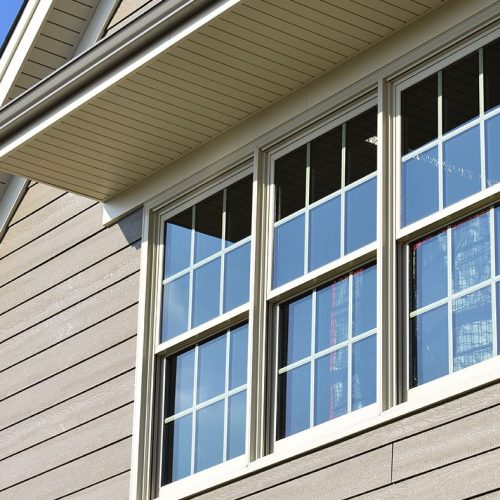Vinyl vs. Aluminum Windows: Which Should You Choose?
Two of the most popular types of window frames are vinyl and aluminum. Both are affordable options that offer different benefits. When comparing vinyl vs aluminum windows, homeowners often debate which material is more durable and better suited to their specific needs.
Replacing your home’s windows doesn’t have to be daunting or overly costly. Two commonly chosen types of window frames are vinyl window and aluminum window. Each offers distinct advantages. Vinyl provides superior insulation and energy efficiency, while aluminum is more resilient in extreme temperatures and resistant to fading from sunlight.
What Are Aluminum Windows?
Aluminum windows offer greater strength compared to vinyl, making them suitable for larger window installations and areas prone to extreme weather conditions like hurricanes or tornadoes. They come in various colors but generally lack the customization options of vinyl windows, which offer a wider selection of styles and textures. However, aluminum windows tend to be more expensive, susceptible to dents and scratches, and require regular maintenance to ensure they remain clean and functional.
What Are Vinyl Windows?
Vinyl windows are crafted from polyvinyl chloride (PVC), a cost-effective material that is easy to maintain and clean. They offer greater durability and affordability compared to traditional wood frames, making them a preferred choice in modern homes. Vinyl windows retain the classic aesthetic of traditional windows and some brands even provide wood-like textures.
While vinyl windows are generally suitable for most homeowners due to their popularity and practicality, there are specific situations where aluminum windows may be a more suitable option.
Differences Between Aluminum and Vinyl
Appearance and Aesthetics
Vinyl windows offer a wide range of aesthetic options, including smooth textures, matte finishes, faux wood-grain designs, and numerous other styles. This versatility makes vinyl windows adaptable to both existing and new home designs.
In contrast, aluminum windows have limited customization options. While they can be found in almost any color, their design flexibility beyond color choices is constrained. Aluminum windows typically maintain their distinctive appearance, which may complement specific architectural styles but might appear mismatched in others.
Energy Efficiency
Vinyl windows outperform aluminum windows in terms of energy efficiency. The energy efficiency of a window is determined by its ability to resist heat flow, measured by the R-Value. Higher R-values signify greater thermal resistance and improved energy efficiency. Vinyl windows typically boast R-Values ranging from 4 to 6, indicating their superior thermal performance. In contrast, aluminum windows usually have lower R-Values ranging from 0.5 to 1.5, reflecting their inferior thermal resistance and reduced energy efficiency.
Insulation
Aluminum, being a metal, conducts heat more efficiently than vinyl. This means that aluminum windows can lead to more heat loss during winter months, potentially resulting in higher heating bills. In contrast, vinyl windows have lower heat conductivity, meaning they retain heat longer compared to aluminum windows.
If you live in an area with significant temperature fluctuations between seasons, the heat transfer properties of aluminum windows could impact your heating and cooling costs. In such cases, vinyl windows are generally a better choice because their superior insulation helps reduce the strain on your home’s HVAC system.
Installation
Vinyl is generally easier to work with due to its flexibility compared to aluminum, which is rigid and less forgiving during installation. Achieving a proper fit with aluminum windows requires meticulous precision to ensure they sit correctly.
For installing new windows, it’s highly recommended to hire a professional contractor. Professionals can install windows more efficiently, ensuring the job is done correctly the first time. This approach not only saves time but also reduces the risk of encountering installation issues later on.
Strength and Damage Probability
Aluminum windows offer superior strength compared to vinyl, making them ideal for areas prone to extreme weather conditions or earthquakes. However, despite their strength, aluminum is relatively soft, making it susceptible to dents and scratches.
Unlike vinyl windows, damage to aluminum windows is more noticeable, leading to a less graceful aging process. While scratches can be easily covered with a fresh coat of paint, managing dents can be more challenging and may affect the overall appearance of the windows.
Maintenance and Cleaning
Vinyl windows are extremely low-maintenance, requiring almost no upkeep once installed. They may need occasional cleaning for aesthetic purposes, but they are resistant to mold and algae growth, making maintenance minimal.
On the other hand, aluminum windows require more attention to prevent rust and mold buildup, especially in humid or rainy climates. Regular cleaning is necessary to maintain their appearance and functionality, which can be more demanding compared to vinyl windows.
When deciding between vinyl vs aluminum windows, it’s important to consider that aluminum frames are significantly stronger than vinyl, making them a preferred choice for durability and structural integrity. While vinyl windows offer benefits like better insulation and lower maintenance, aluminum windows excel in strength and longevity, making them ideal for areas requiring robust construction and security.
If you are looking for contractors for your upcoming home renovation project at New America Construction we provide windows estimates for all NJ homeowners.
Call us for more information 973-804-9400
Find us in:


